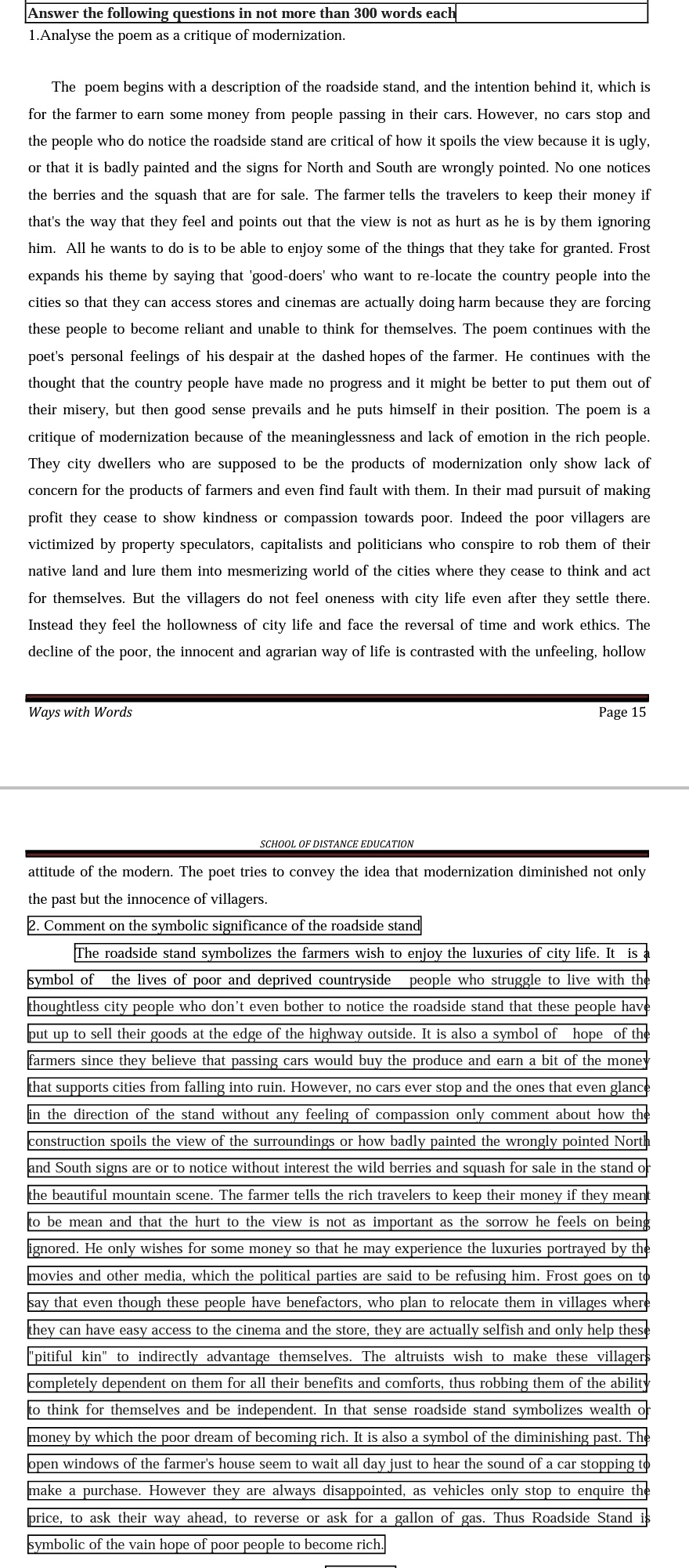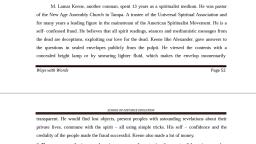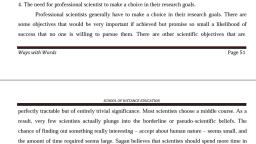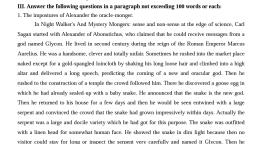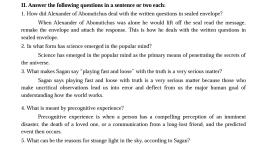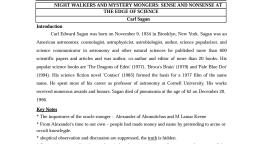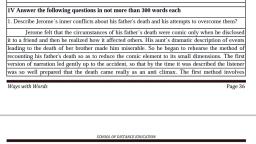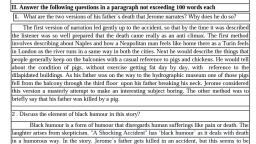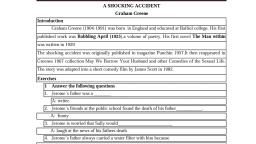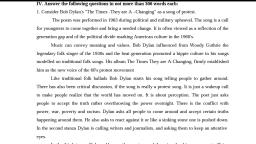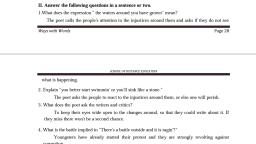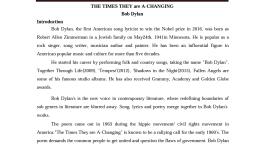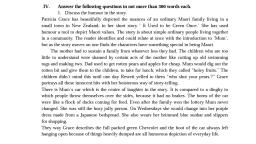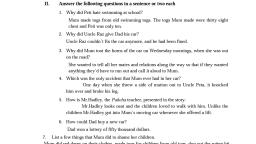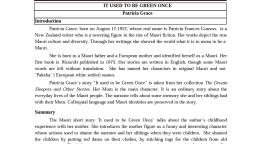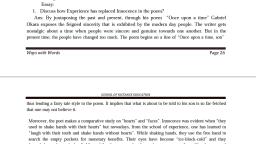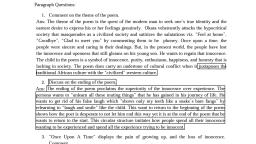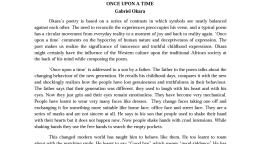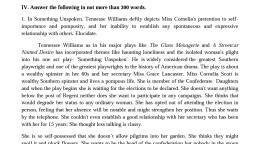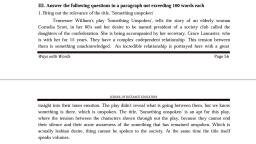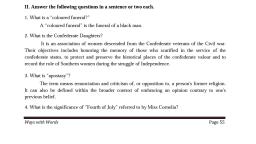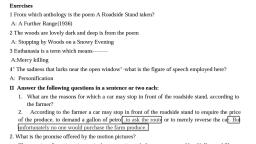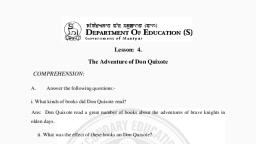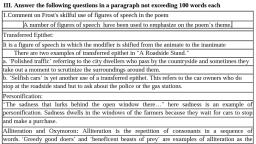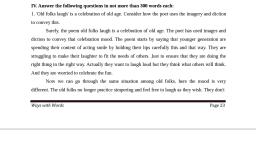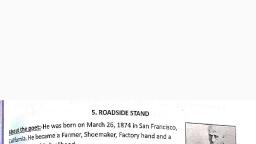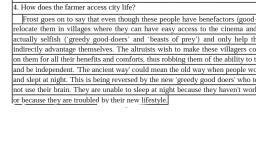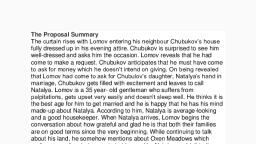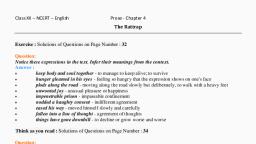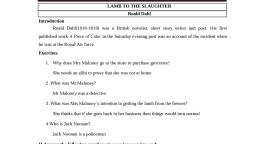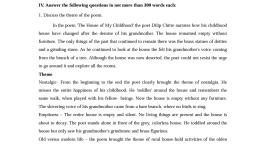Page 1 :
Answer the following questions in not more than 300 words each], , , , 1.Analyse the poem as a critique of modernization., , The poem begins with a description of the roadside stand, and the intention behind it, which is, for the farmer to earn some money from people passing in their cars. However, no cars stop and, the people who do notice the roadside stand are critical of how it spoils the view because it is ugly,, or that it is badly painted and the signs for North and South are wrongly pointed. No one notices, the berries and the squash that are for sale. The farmer tells the travelers to keep their money if, that's the way that they feel and points out that the view is not as hurt as he is by them ignoring, him. All he wants to do is to be able to enjoy some of the things that they take for granted. Frost, expands his theme by saying that 'good-doers' who want to re-locate the country people into the, cities so that they can access stores and cinemas are actually doing harm because they are forcing, these people to become reliant and unable to think for themselves. The poem continues with the, poet's personal feelings of his despair at the dashed hopes of the farmer. He continues with the, thought that the country people have made no progress and it might be better to put them out of, their misery, but then good sense prevails and he puts himself in their position. The poem is a, critique of modernization because of the meaninglessness and lack of emotion in the rich people., They city dwellers who are supposed to be the products of modernization only show lack of, concern for the products of farmers and even find fault with them. In their mad pursuit of making, profit they cease to show kindness or compassion towards poor. Indeed the poor villagers are, victimized by property speculators, capitalists and politicians who conspire to rob them of their, native land and lure them into mesmerizing world of the cities where they cease to think and act, for themselves. But the villagers do not feel oneness with city life even after they settle there., Instead they feel the hollowness of city life and face the reversal of time and work ethics. The, , decline of the poor, the innocent and agrarian way of life is contrasted with the unfeeling, hollow, , or ceeteeontnanetnninsamstisamtntnannetntttnantinsnttntntnanattnnintnnartnttn, Ways with Words Page 15, , ‘SCHOOL OF DISTANCE EDUCATION, attitude of the modern. The poet tries to convey the idea that modernization diminished not only, , the past but the innocence of villagers., , , , , , , , 2. Comment on the symbolic significance of the roadside stand|, , , , , , , , [The roadside stand symbolizes the farmers wish to enjoy the luxuries of city life. It_is, , , , , , Bymbol of _ the lives of poor and deprived countryside people who struggle to live with th, , , , , , [thoughtless city people who don’t even bother to notice the roadside stand that these people hav}, , , , , , ut up to sell their goods at the edge of the highway outside. It is also a symbol of _hope_of tht, , , , , , farmers since they believe that passing cars would buy the produce and earn a bit of the money, , , , , , fhat supports cities from falling into ruin. However, no cars ever stop and the ones that even glanch, , , , , , , , fin the direction of the stand without any feeling of compassion only comment about how th}, , , , , , , , konstruction spoils the view of the surroundings or how badly painted the wrongly pointed Nort, , , , , , fnd South signs are or to notice without interest the wild berries and squash for sale in the stand of, , , , , , {he beautiful mountain scene. The farmer tells the rich travelers to keep their money if they meant, , , , , , fo be mean and that the hurt to the view is not as important as the sorrow he feels on being, , , , , , lignored. He only wishes for some money so that he may experience the luxuries portrayed by thp, , , , , , , , jovies and other media, which the political parties are said to be refusing him. Frost goes on ti, , , , , , fay that even though these people have benefactors, who plan to relocate them in villages wher, , , , , , they can have easy access to the cinema and the store, they are actually selfish and only help thesP, , , , , , [‘pitiful_kin" to indirectly advantage themselves. The altruists wish to make these villager}, , , , , , [completely dependent on them for all their benefits and comforts, thus robbing them of the abilit), , , , , , fo think for themselves and be independent. In that sense roadside stand symbolizes wealth of, , , , , , joney by which the poor dream of becoming rich. It is also a symbol of the diminishing past. Thf, , , , , , , , fopen windows of the farmer's house seem to wait all day just to hear the sound of a car stopping t, , , , , , ake a purchase. However they are always disappointed, as vehicles only stop to enquire thf, , , , , , , , rice, to ask their way ahead, to reverse or ask for a gallon of gas. Thus Roadside Stand if, , Bymbolic of the vain hope of poor people to become rich.
